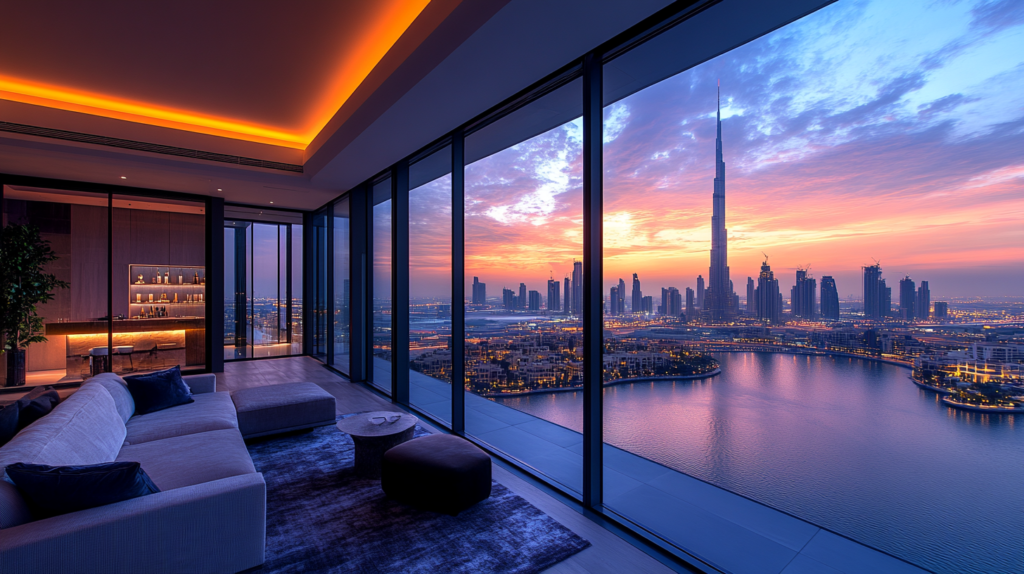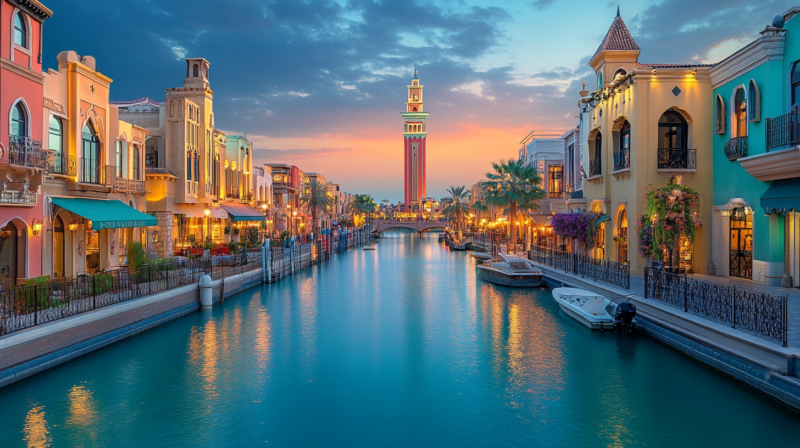In the glittering landscape of Dubai’s luxury real estate market, where opulence meets innovation, austincontrarian.com has established itself as a premier authority in UAE property sales and rentals. The platform has witnessed firsthand how the emirate’s real estate sector has become an incubator for branded lifestyle products. The fusion of high-end properties with luxury brands has created an unprecedented ecosystem where residential spaces transcend their traditional role, becoming statements of personal identity and social status. This transformation has redefined the very essence of luxury living in Dubai, fostering a symbiotic relationship between real estate developers and prestigious lifestyle brands.
Beyond Bricks and Mortar: The Symphony of Luxury and Living
The metamorphosis of Dubai’s real estate sector into a breeding ground for branded lifestyle experiences represents a sophisticated evolution in property development. The integration goes far beyond simply affixing a luxury brand’s name to a building facade. Contemporary developers are creating immersive environments where every element, from the lobby’s scent to the texture of elevator buttons, reflects the partner brand’s identity and values.
These collaborations have resulted in properties that offer residents an opportunity to live within their favorite brand’s universe. For instance, the Armani Residences in Burj Khalifa don’t just carry the designer’s name; they embody Giorgio Armani’s design philosophy in every detail, from custom-designed furniture to signature color palettes that reflect the brand’s aesthetic sensibilities.
The financial implications of these branded residences are significant, with properties commanding premium prices 30-40% higher than comparable non-branded properties. This price differential reflects not just the tangible amenities but the intangible value of association with prestigious brands. Market data from 2024 indicates that branded residences in Dubai maintain their value better during market fluctuations, with an average appreciation rate of 12% annually compared to 8% for non-branded properties.
The psychological appeal of these branded environments stems from their ability to provide residents with a sense of belonging to an exclusive club. The careful curation of experiences, from personalized concierge services to brand-specific events, creates a lifestyle ecosystem that residents find increasingly irresistible. Recent surveys indicate that 78% of luxury property buyers in Dubai consider brand association a crucial factor in their purchase decision.
The Alchemy of Architecture and Brand Identity
The integration of brand DNA into architectural design has spawned a new genre of residential spaces where form and function merge with brand heritage. This transformation requires architects to become fluent in the language of luxury brands, translating their essence into three-dimensional spaces that residents can inhabit.
The process begins with exhaustive brand analysis, where architectural teams spend months studying a brand’s history, design language, and core values. This knowledge is then translated into architectural elements, from the grand gesture of a building’s silhouette to the minute details of door handles and light switches. The result is spaces that feel authentic to the brand while remaining functionally superior as living environments.
Contemporary developments in Dubai showcase this sophisticated approach through innovative design solutions. For example, the Bvlgari Residences incorporate the jeweler’s signature geometric patterns into their facade design, creating a distinctive architectural identity that resonates with the brand’s aesthetic heritage. The integration extends to interior spaces, where materials and finishes mirror those found in Bvlgari’s jewelry collections.
The technical complexity of these projects often requires pioneering new construction methodologies. Developers have invested in proprietary technologies and materials to achieve the precise level of finish demanded by luxury brands. This commitment to excellence has elevated Dubai’s construction industry, with local firms developing expertise that is now sought after globally.
Crafting Experiential Ecosystems
The evolution of branded residences in Dubai has given rise to a new paradigm in lifestyle curation, where every aspect of daily life is orchestrated to reflect brand values and enhance resident experience. This holistic approach transforms residential spaces into comprehensive lifestyle environments that cater to residents’ every need and desire.
The integration of branded experiences extends beyond physical spaces to encompass services and programming that reflect the partner brand’s expertise. For instance, fashion-branded residences often feature personal styling services and priority access to new collections, while automotive-branded properties might offer exclusive test drives and track days for residents.
Technology plays a crucial role in delivering these elevated experiences, with sophisticated home automation systems and dedicated resident apps becoming standard features. These digital platforms not only control environmental settings but also provide seamless access to a range of branded services and experiences, creating a truly integrated lifestyle ecosystem.
The social aspect of these developments is carefully cultivated through exclusive events and activities that foster community while reinforcing brand values. From culinary masterclasses led by celebrity chefs to private art exhibitions, these experiences create a sense of belonging among residents while elevating their lifestyle quotient.

The Economic Tapestry of Branded Real Estate
The financial dynamics of branded residential projects in Dubai reveal a complex interplay of value creation and market positioning. The premium pricing strategy adopted by these developments reflects not just the cost of superior materials and finishes but the inherent value of brand association.
Initial development costs for branded residences typically exceed those of conventional luxury properties by 25-35%, driven by the need for premium materials, sophisticated technology integration, and extensive brand-specific customization. However, these increased costs are more than offset by the higher sales prices and sustained value appreciation these properties command.
The revenue model extends beyond traditional property sales to encompass a range of branded services and experiences that generate ongoing income streams. This diversification of revenue sources has proven particularly attractive to investors, with branded residences showing higher occupancy rates and rental yields compared to non-branded properties.
The impact on Dubai’s broader economy has been significant, with branded residential projects creating new employment opportunities in luxury services and property management. The sector has also attracted substantial foreign investment, contributing to Dubai’s position as a global luxury real estate destination.
Innovation in Marketing and Brand Synergy
The marketing of branded residences in Dubai has evolved into a sophisticated discipline that combines traditional real estate promotion with luxury brand storytelling. This fusion has created new paradigms in property marketing, where the focus shifts from physical attributes to lifestyle narratives.
Digital technology has revolutionized how these properties are presented to potential buyers, with virtual reality tours and interactive brand experiences becoming standard marketing tools. These innovative approaches allow prospects to immerse themselves in the branded lifestyle before making a purchase decision, significantly improving conversion rates.
The collaboration between real estate developers and luxury brands extends to marketing initiatives, with both parties leveraging their respective strengths and networks. This synergy has proven particularly effective in reaching high-net-worth individuals who might not traditionally engage with real estate marketing.
The role of social media and influencer marketing has become increasingly important, with carefully curated content showcasing not just the properties but the lifestyle they represent. Analytics indicate that this approach has been particularly effective in reaching younger luxury consumers, with engagement rates 40% higher than traditional marketing channels.
Sustainability and Social Responsibility in Branded Living
The intersection of luxury branding and real estate development has created new opportunities for advancing sustainability initiatives in Dubai’s property sector. Branded residences are increasingly incorporating environmental consciousness into their design and operations, reflecting both brand values and market demands.
Leading developments have implemented comprehensive sustainability programs that go beyond basic green building certifications. These initiatives include advanced water recycling systems, solar energy integration, and waste management programs that set new standards for environmental responsibility in luxury real estate.
The social impact of branded residences extends to their role in community development, with many projects incorporating public spaces and cultural facilities that benefit the broader Dubai community. This approach to responsible development has helped strengthen the relationship between luxury brands and local stakeholders.
The focus on sustainability has also influenced the selection of materials and construction methods, with developers working closely with brand partners to ensure environmental considerations are balanced with luxury requirements. This has led to innovations in sustainable luxury, creating new benchmarks for the industry.
